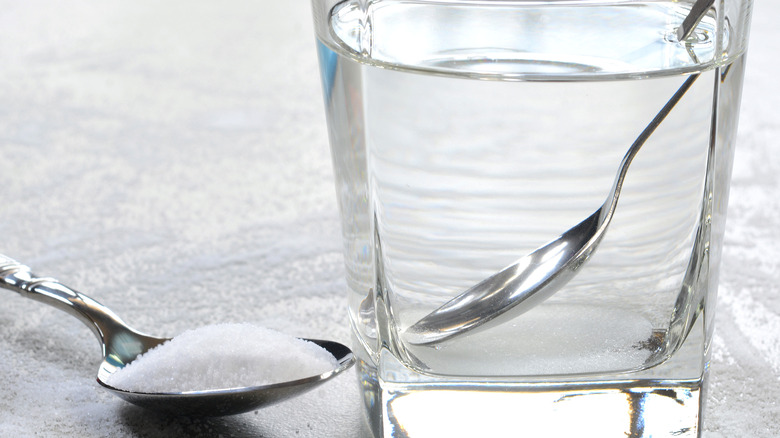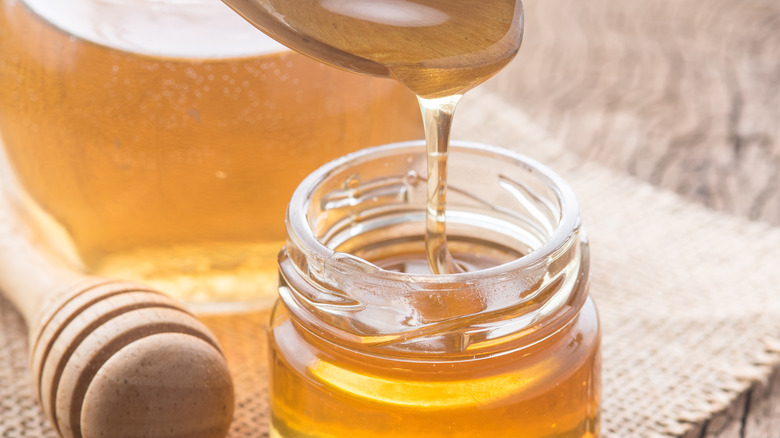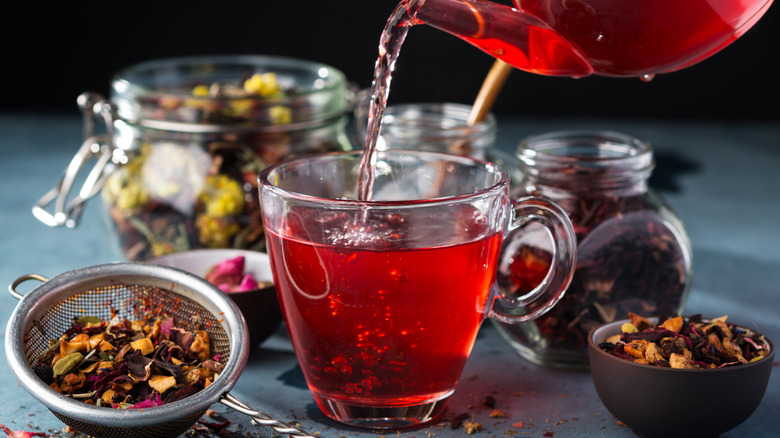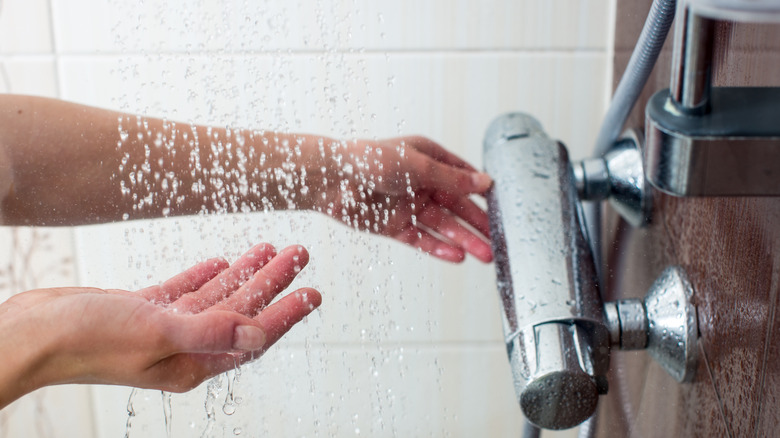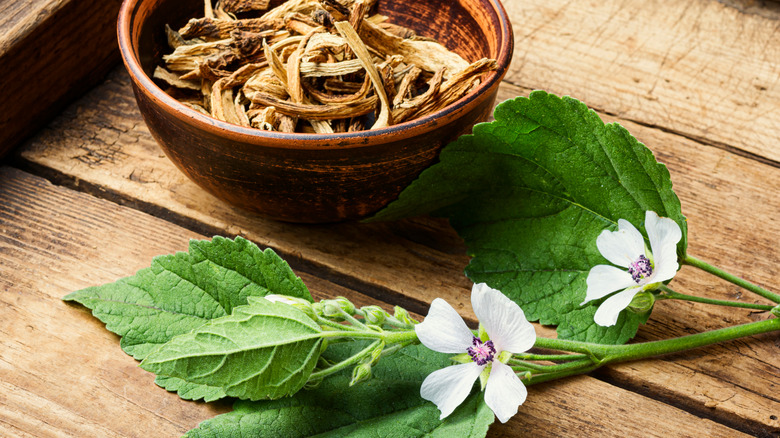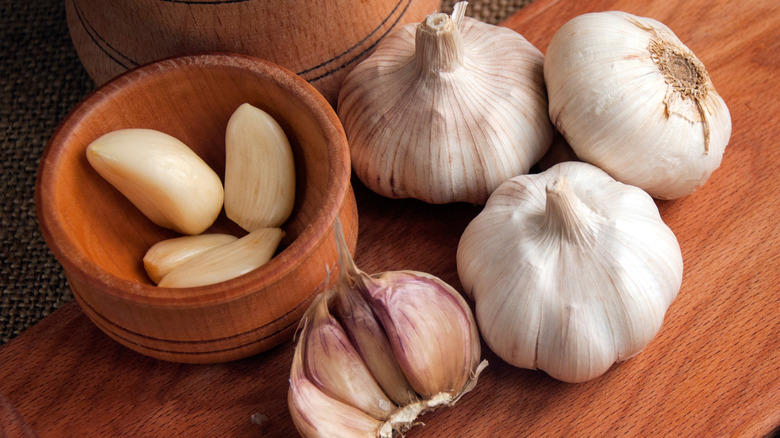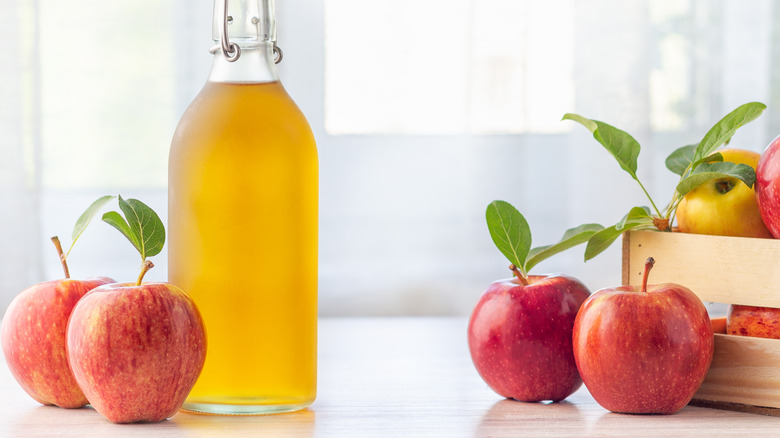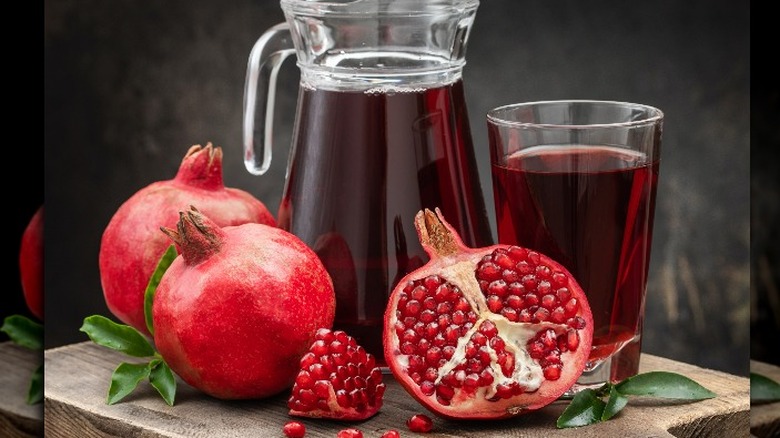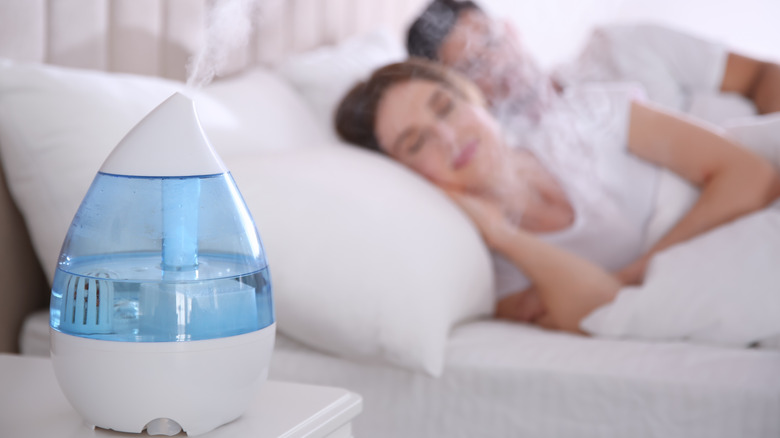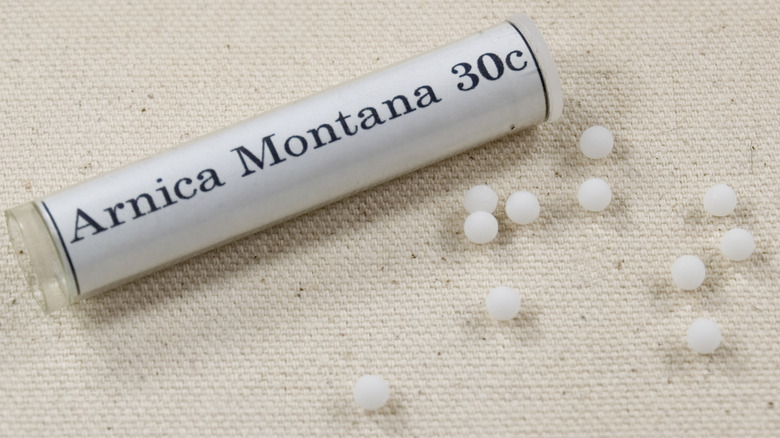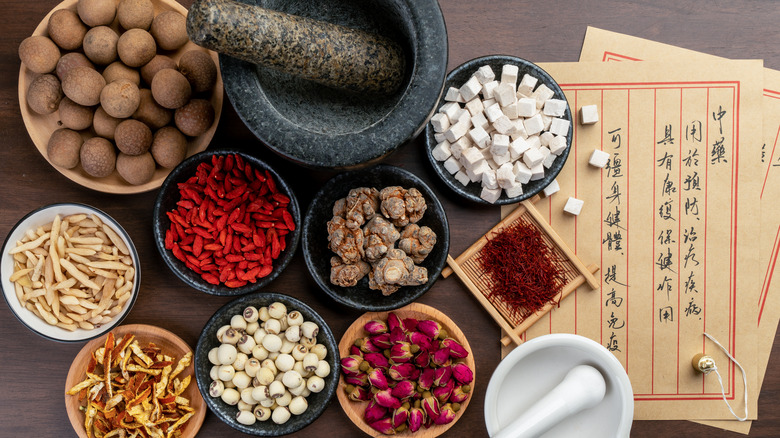24 Tricks You Need To Try If You Have A Sore Throat
A sore throat is unmistakable. If it takes a monumental amount of will power to swallow down your own saliva, you don't need anyone to tell you what symptom you're experiencing. A sore throat can be miserable — regardless of if it is an isolated issue or one of many signs of illness you're experiencing. As Brett M. Scotch, a Florida-based osteopathic physician explained in an interview with the American Osteopathic Association, "A sore throat can be caused by any number of factors, including a common cold, low humidity, smoking, air pollution, yelling, or nasal drainage."
No matter the cause, though, you can get some sore throat relief almost instantly with the help of some handy hacks and tickle-reducing tricks. From sipping a boozy beverage to using a numbing all-natural spray, Health Digest is sharing the scoop on how you can start to feel better faster. So pour yourself a cup of herbal tea (peppermint, if you've got it!), and read on. Calming help and soothing sick-day tips are on the way!
Gargling with warm salt water provides symptomatic relief from a sore throat
You do not necessarily need to run to the grocery store or pharmacy to get all the supplies you'll need to ease your sore throat symptoms. One of the simplest solutions? Mix one-quarter to one-half teaspoon of table salt in a half cup to one full cup of warm water, as recommended by the Mayo Clinic. "Children older than 6 and adults can gargle the solution and then spit it out," the organization explained.
Sorana Segal-Maurer, internal medicine physician, explained to WebMD why it's an effective option, saying, "You're creating a high-salt barrier and you're pulling out a lot of fluids from the tissues in the throat area, so you're washing the virus out. The salt functions as a magnet for water. It's good for symptomatic relief." She clarified, though, that it's "not going to cure a viral infection." Nevertheless, you most likely have access to water and salt — so it can't hurt to try!
By the way, rinsing out your mouth with salt water can also help reduce the acute pain associated with a toothache, while gargling with plain old H20 can potentially prevent respiratory tract infections (via WebMD).
Sweeten your sore throat situation with honey
Need to sooth that scratchy throat of yours? We have got you covered, honey! It is not quite Mary Poppins' go-to solution, but a spoonful of, um, honey will help the medicine go down. A study published in the National Journal of Physiology, Pharmacy and Pharmacology found that when patients took one tablespoon of honey twice daily in tandem with anti-inflammatory medications, antibiotics, and gargle solutions, they reported feeling better sooner and recovered faster than those who got the same treatments sans the bee byproduct.
Furthermore, a paper published in Molecules noted many of honey's amazing health benefits: It acts like an inflammation-fighting antioxidant with antimicrobial, antiviral, antifungal, and anticancer characteristics. So sore throat aside, you might want to consider adding a little bit of sweetness to your daily routine anyway. It is also worth noting that raw honey might boast more goodness than pasteurized forms, according to Healthline, so do your due diligence when shopping to find one that's the bee's knees.
Try an echinacea and sage tea or spray to curb your sore throat
As part of a study published in the European Journal of Medical Research, 154 sore throat patients tried either an echinacea and sage throat spray or a chlorhexidine and lidocaine throat spray. The researchers found that the natural spray was as effective as the medicated numbing version. This is good news for those who prefer herbal remedies.
If you'd rather not spritz your throat with a spray, though, you can make yourself a cup of soothing echinacea and sage tea instead. Prevention recommends boiling a teaspoon of dried echinacea root in water, covering for a few minutes before taking it from the flame, and adding a teaspoon of dried sage. Once more, let it rest for a few minutes, strain, pour, and sip. As noted by the publication, both echinacea and sage are antibacterial and perform like "topical anesthetics" — hence the spray works similarly to numbing agents.
Raise the head of your bed to put an end to your sore throat
Sleeping with a sore throat can feel nearly impossible. With every toss, turn, and inadvertent swallow, you feel the burn. One possible way to help you get to Snoozeville faster — and stay there longer — is to boost yourself up a bit and elevate your head to allow your sinuses to more readily drain, according to WebMD.
Sleep Advisor recommends using a wedge pillow with a "natural and gradual incline" to keep your noggin at an angle. An even better solution? "Raise the head of the bed instead," as recommended by WebMD. This will prevent your neck from getting stuck in an awkward position that can also make breathing more labored. By putting "large books under the legs of your headboard" and making sure they are nice and sturdy, you will get a better angle without sacrificing your comfort or your air flow.
Fight a sore throat with an ice pop
Hey, a sick day does not have to be all yucky-tasting medicines and herbal remedies. Treat yourself and soothe your throbbing throat with a sweet treat: an ice pop. Professor Ron Eccles, former director of the Common Cold Centre at the University of Cardiff, told Medical News Today that "ice lollies [pops] would be a good treatment for sore throat as they have a local cooling effect on inflamed tissues and may have a specific inhibitory effect on pain-sensitive nerves in the throat." An ice pop a day may not keep the doctor completely away, but it can relieve acute pain and give us something to smile amount: win-win!
And if you do not like the cold sensation, but still want a treat? Try hard candy. As noted by Healthline, they can "increase your saliva production and help keep your throat lubricated." Of course, a lozenge with a numbing menthol medication would be even more effective.
Soothe a sore throat with any of these herbal teas
A comforting cup of tea can help you feel more relaxed when you're sick with a sore throat, and give you some much needed pain relief. Dr. Stephen Parodi, an infectious disease expert, told Prevention, "Warm tea or other drinks can help soothe the inflammation, clear nasal passages, and reduce the amount of mucus coming from the nasal passages that might further irritate the throat."
A nice hot sip of ginger tea with its anti-inflammatory properties could put you on the road to recovery. If ginger isn't your thing, perhaps a cup of peppermint tea will do the trick. Menthol, an active ingredient in peppermint, provides a cooling benefit; furthermore, it has antibacterial benefits. Looking for something more subtle for your sick day? For "a more classic herbal tea," tea sommelier Lisa McDonald told Prevention, try "chamomile with a touch of honey. The tea is very calming, and the honey offers a smooth sweetness to help coat the throat." Chamomile has also been shown to "lubricate" and soothe the throat.
Don't underestimate the sore throat-fighting powers of water
If you have been avoiding swallowing because, well, ouch, it hurts to get anything down with a sore throat, you might be doing your body an injustice. It is important to stay hydrated, but even more critical when you are ill. Thankfully, drinking ice cold water can help numb the pain, thus making it easier to get your needed fluids. It will also help to lessen your congestion, thin mucus, and keep your throat nice and coated, MedicineNet revealed.
You will want to be especially stringent about hydrating if you have a fever as it "draws moisture out of your body," as noted by WebMD. Furthermore, if you're dealing with a lot of mucus, you're probably losing additional fluids. Finally, cold medicines can also dry you up, further fueling the need for constant hydration. Drink up, but be sure to avoid caffeinated beverages, like coffee, and alcohol, as these drinks can further dehydrate you, per MedicineNet.
A steamy shower can ease a sore throat
If your mom ever put you in a steamy bathroom when you were a kid during a middle-of-the-night coughing fit, she did it for good reason. Take heed from your wise mama; next time you are feeling not so great with a sore throat to boot, hit the showers — and turn up the temp.
Breathing in this swampy warm air can help with swelling and discomfort. If you don't want to hop in the shower, you can get the same effect at the sink. First, let the tap run very hot. "Drape a towel over your head and lean into the sink to breath in the steam," suggested Healthline. The site also recommends boiling a pot of water for a half an hour to "increase humidity in your house." You can even enhance the experience simply by adding "a tablespoon of menthol ointment." This will help if your sore throat is linked to congestion. Running a humidifier would, of course, do the trick as well.
A hot toddy may help you forget about your sore throat
Sipping a warm beverage is great and all, but how about having a spiked warm beverage? Could a hot toddy be the post-five o'clock answer to alleviate some of your sore throat pain?
As noted by Medical News Today, there is no strict scientific study that confirms a hot toddy is an effective sore throat or cold remedy. Anecdotally, however, lots of enthusiastic sippers will tell you that hot water mixed with whiskey and little bit of lemon and honey is a magical concoction to soothe your nasty symptoms. A, honey certainly has throat-soothing benefits — and lemon does too. Furthermore, adding spices like ginger or cinnamon can amplify the sickness-fighting perks.
Nevertheless, whiskey can have a dehydrating effect, potentially worsening your symptoms. So drink with caution; you could end up doing more harm than good. An arguably better choice is to replace the whiskey with tea for a non-alcoholic but equally comforting cup of yummy in your tummy (and soothy in your throaty?).
When life hands you lemons, use them to treat your sore throat
As of this writing, there isn't clear-cut proof that lemon can cure or help your sore throat. However, as explained by Medical News Today, lemons are high in Vitamin C, a nutrient which many people believe boosts the immune system. Some research has indicated that Vitamin C could shorten the duration of a cold — so if you've got a sore throat, a case of the sniffles, or a cough, it certainly can't hurt and might even help. Just don't expect a squeeze or two of lemon to magically cure your illness.
Penn Medicine explained that lemons may help to loosen mucus. A teaspoon of the citrus ingredient in a cup of warm water might just do the trick. And, hey, it tastes better than the institution's other recommendation: Gargle with warm water mixed with a small amount of hot sauce. Hard pass.
Some alternative, natural treatments may rid you of your sore throat
Since ancient times, people have turned to natural remedies and alternative treatments to heal their bodies. While the efficacy of some of these methods are questionable, there is also some evidence and anecdotal proof that others work.
Marshmallow root is one example. As noted by Medical News Today, it has a "gelatin-like substance called mucilage that coats and lubricates the throat when a person swallows it." The site even alluded to multiple studies that have noted its usefulness in treating colds, sore throats, and coughs. Similarly, licorice root is a potential treatment. According to research published in Acta Pharmaceutica Sinica B, the natural ingredient has "antiviral, antimicrobial, anti-inflammatory," and other beneficial properties. While it hasn't been proven to treat sore throats, it has been shown to reduce pain after the removal of a throat tube post-surgery (via the European Journal of Anaesthesiology).
Cinnamon tea or cinnamon almond milk may also soothe a sore throat as the spice is known to relieve throat pain. You can also try adding two tablespoons of coconut oil to a warm cup of water to provide extra moisture to your dry throat (via Medical News Today).
Crush your sore throat with garlic
Think you might be coming down with something? If you feel that telltale drip, drip, drip in your throat, get ahead of the curve and crush that sore throat before it even begins using some raw garlic.
New York-based holistic physician Michael Finkelstein told Real Simple that garlic is antimicrobial and antibacterial, and it might even be able to ward off symptoms and illness. As explained by the publication, when garlic is chewed, cut, or crushed, the compound allicin is activated — and this is where the real healing benefits are. Of course, eating raw garlic is not going to earn you any friends.
Dr. Finkelstein recommends warming a clove in the microwave for a few seconds to reduce the overpowering taste. Next, crush the garlic and spread onto a cracker. Even if it doesn't end up helping your throat, it could be good for your overall health. But maybe consider trying garlic supplements instead; they are known to lower cholesterol and reduce blood pressure (via Real Simple).
Apple cider vinegar may just help treat your sore throat
Although apple cider vinegar (aka ACV) is not a cure-all by any means, anecdotal evidence demonstrates that it can help you get rid of a sore throat. Research published by Natural Product Research noted that apple cider vinegar boasts antibacterial properties. Of course, not all sore throats are caused by bacteria. In fact, most are caused by viruses, as noted by Healthline. Still, the site pointed out that apple cider vinegar "creates an alkaline environment in the body," and this can help to eradicate bacteria and viruses which tend to "thrive in a more acidic" condition.
Furthermore, "organic, cold-pressed ACV contains silky threads, called 'the mother,' ... a probiotic substance that may help boost the immune system." Finally, it can be used to loosen up mucus — so there are plenty of reasons to at least give it a go.
You can consume ACV in tea or add it to water and gargle with the solution. Either way, it's important to remember that apple cider vinegar is only safe to consume when diluted; taken straight it can cause burns to the throat, esophagus, and stomach lining (via Healthline).
Many hot soups possess properties that can help to soothe a sore throat
"Let food be thy medicine, and let medicine be thy food," goes the old saying that is sometimes attributed to the father of modern medicine, Hippocrates. Although reasonable minds may differ regarding the extent to which this notion ought to be taken literally (via Medical News Today), the notion that a nice, hot bowl of soup can help soothe a sore throat is practically ubiquitous.
Actually, all hot liquids have the power to temporarily relieve sore throat pain, according to Professor Ron Eccles, an expert on the common cold (via Medical News Today). In part, this is because hot fluids promote salivation, which can relieve any dryness associated with sore throat. But soups that are rich in vitamins and minerals can help speed recovery. This includes chicken soup made with chicken bones, according to Livestrong. It also includes soups made with carrots, onion, garlic, ginger and other anti-inflammatory foods.
Maryland-based internal medicine physician Dr. Sonya Chawla recommends sticking with lower-sodium soups, because salt can be dehydrating (which is essentially the opposite of what you want when your throat hurts). Dr. Chawla also recommends avoiding spicy soups.
There's a spicy solution to sore throat
Some health experts, including Maryland-based internist Dr. Sonya Chawla, advise steering away from spicy soups when your throat already feels like it's on fire. As Dr. Chawla explains (and quite reasonably at that), "anything spicy can be very irritating" to the throat (via Livestrong). However, some health professionals recommend consuming hot sauce to relieve a sore throat. In fact, hot sauce "has actually been proven to provide relief from sore throats," according to Dr. Charlotte Smith, writing for the Penn Medicine Health and Wellness blog.
As Dr. Smith explains, "hot sauce is made from peppers that are high in capsaicin," and capsaicin is routinely to provide topical relief for pain and inflammation. The caveat here is that you shouldn't drink hot sauce straight — not for this purpose, or possibly any other. In fact, you shouldn't swallow it at all. Instead, Smith recommends adding a few drops of hot sauce into a glass of warm water, and then gargling with the mixture (and spitting it out after).
Otolaryngologist Dr. Steven Kmucha would appear to concur with Dr. Smith (via eMediHealth). However, Dr. Kmucha adds that hot sauce may also offer antimicrobial benefits, based on this 2015 study published in Frontiers in Microbiology.
Drink pomegranate juice (or eat pomegranate)
Pomegranate is known to have anti-inflammatory, antioxidant, and anti-cancer properties and has been used medicinally throughout history, according to Manal S. Mansouri, a professor at King Abdulaziz University, Jeddah, Saudi Arabia, via an academic paper he wrote that was published in 2019 in the Pharmacophore Journal. "Recently," Dr. Mansoury wrote at the time, "numerous studies have proven the effectiveness of ... pomegranate juice in the treatment of" no less than 15 separate medical conditions, including sore throat. Mansoury credits the active plant ingredient ellagic acid, an antioxidant that is found in abundance in pomegranate seeds and pomegranate juice, for this.
That said, the National Center for Complementary and Integrative Health appears to be somewhat skeptical about pomegranate's efficaciousness in treating major illnesses and conditions such as "heart disease, high blood pressure, high blood cholesterol levels, cancer, and diabetes," at least until more scientific research firmly supports these claims. However, other healthcare professionals back up the notion that pomegranate can help soothe a sore throat. "Pomegranate is a known for having high amounts of vitamin C and antioxidants that can help you quickly recover from a sore throat," according to Healthcare Associates of Texas. In fact, consuming the seeds may be particularly helpful at reducing the swelling and inflammation that's causing your throat to hurt.
Consume a banana to soothe a sore throat
Bananas are one of the four foundations of the BRAT diet, which Piedmont therapeutic dietitian Lena Beal says pediatricians have traditionally recommended for children suffering from minor intestinal woes such as nausea, vomiting, and diarrhea (via Piedmont Healthcare). The acronym BRAT stands for bananas, rice, applesauce, and toast, but we're here to point out that bananas may be seriously underutilized as a source of sore throat relief. As Medical News Today points out, bananas are "a soft and healthful fruit" that be gentle on a sore throat.
As to the latter, bananas may be even more soothing to a sore throat when served pre-mashed, according to Healthcare Associates of Texas, which says that this helps them "glide easily down your throat." In addition, some of the nutrients that occur naturally in bananas have been associated with improving health and feelings of well-being, whether your throat is sore or not. These include potassium, which has been proven effective at relieving acute sore throat, per a 2012 meta-analysis of existing studies published in Clinical Microbiology and Infection. Bananas also contain vitamin C, which is known to help speed recovery from the common cold (via Healthline).
Sleep with a humidifier near your bed
"Breathing in moist air can help soothe swollen tissue in your nose and throat," according to Healthline. Indeed, "if you've noticed an increase in the number of sore throats you've had this season, then it may be time to invest in a humidifier," according to Dr. Charlotte Smith, writing for the Penn Medicine Health and Wellness blog. "Dry air, especially during the harsh, cold days of winter, may be the cause of your sore throat," she explains. The purpose of a humidifier is to keep the ambient air moist, which can be beneficial when it comes to keeping the airways, including the sinuses, open.
If you're already dealing with a sore throat, Dr. Smith recommends bolstering your humidifier's efficacy by adding a small amount of either vapor rub for relief from immediate soreness or hydrogen peroxide to help keep germs from spreading to others in the home (via Occupational Health & Safety). In each case, a tablespoon or two is sufficient. If you don't have access to a humidifier and you're looking for immediate relief, go with the steamy shower trick (via Healthline). If and when you decide it's time to invest in a humidifier for this purpose, Healthline recommends going with a cool mist humidifier, which can be found at many retailers.
Try a sore throat anesthetic
Sore throat sprays were all the rage when the first anesthetic sore throat spray was introduced in 1952, according to The Washington Post. That first sore throat spray, Chloraseptic, was groundbreaking, at least at the time. Never before had anyone thought bring to market a suspension of mild, topical anesthetic in a non-toxic liquid, that one could deploy to dull the pain of a sore throat. One could either spray it directly into the back of their throat (no spitting necessary) or use it to gargle (which required spitting).
Amazingly, these sprays do work, or at least those with phenol or benzocaine as its active ingredient. Other active ingredients that have shown promise in clinical study include the one known as AMC/DCBA, which refers to the active ingredients in Strepsils lozenges (i.e., Amylmetacresol and 2,4-Dichlorobenzylalcohol, according to a 2017 study published in the International Journal of Clinical Practice).
There's evidence that sore throat spray is effective at soothing an infected or otherwise inflamed throat. What a sore throat spray cannot do, however, is sterilize or otherwise cleanse the throat of pathogens, as has long been established by scientific study (via the Washington Post).
Apply a warm compress on your throat
There's no doubt this trick for sore throat relief is about as primitive as it gets, but that's not a bad thing. According to Sunbeam, people have been successfully making themselves feel better with heat therapy for thousands of years. Like food as medicine, heat therapy is another Hippocrates-approved treatment modality for discomfort. Healthline explains that a heated compress applied to any part of the body can help reduce discomfort and possibly even speed up the healing process, because it increases blood flow to wherever it is applied. In addition, MedicineNet notes that a warm compress applied to the throat can help relieve the discomfort associated with swollen lymph nodes.
To use a warm compress for sore throat relief, MedicineNet recommends using a warm heating pad or hot water bottle, or, making your own warm compress the old-fashioned way: wetting a hand towel with hot water, wringing out the excess (and making sure it's not burning hot) before placing it on the skin covering the throat. If you're feeling chills, or just to keep the compress in place, a cozy scarf can help.
Getting enough rest can do wonders for your sore throat
It may be annoying when a friend or family member decides to point out to you how you look tired, and it may even come off as a low-key diss. But the fact is that if you aren't getting enough rest, then your immune system may not be able to fight off infections as well, since getting enough rest is critical to immune system function (via the CDC).
Not getting enough rest not only increases the risk of infection, but can also exacerbate symptoms that go along with exposure to pathogens. Such symptoms include inflammation; in the case of the common cold, which is a frequent cause of sore throat, inflammation will often lead to swelling of the nasal passages. "When your nose is blocked, your body finds it easier to breathe through your mouth," according to the makers of sore throat anesthetic spray Strepsils. That can lead to dryness in the mouth and throat, which, in turn, can lead to or exacerbate existing discomfort, including sore throat.
Since a sore throat can interfere with getting good quality sleep, if you have a sore throat, you may want to try one of these tricks to alleviate discomfort, including over the counter pain-relief medications.
Arnica has shown promise as a homeopathic sore throat remedy
As you may already be aware, arnica (full name: Arnica montana) is a daisy-like flower that has been used medicinally for centuries, per St. Luke's Hospital. Arnica gel can help soothe achy muscles and heal wounds. However, arnica can also be taken orally, albeit only in its homeopathic pill form; consuming the arnica flower itself can be toxic (in pill form, the arnica content is diluted to safe levels).
When taken in pill form, arnica has shown promise in relieving sore throat, according to a 2017 study published in Sage Journals. That study actually comprised two case studies of post-operative patients with severe sore throat owing to intubation (which is standard procedure when a patient is placed under general anesthesia). In both cases, after three doses of homeopathic arnica (200CH dosage) over the course of 36 hours, sore throat symptoms cleared within 48 hours. Since homeopathic arnica pills are still considered experimental, if you're interested in trying this sore throat remedy, you might want to check with your doctor first.
Acupuncture and Chinese herbs for sore throat have also shown promise
Just as a sore throat may respond well to homeopathic arnica, one may also find relief with other non-traditional/alternative medical remedies, per Qineng Tan, L.Ac., Ph.D. & Xiaomei Cai, L.Ac., Ph.D., a pair of alt-medical professionals writing for the Art of Wellness clinic. These remedies include acupuncture, as well as the taking of various medicinal herbs that are prescribed in traditional Chinese medicine, including Yin-Qiao. In addition, many others were reviewed by the authors of a 2012 meta-analysis published in the Cochrane Database of Systematic Reviews and found to be effective.
Acupuncture is something you would need to obtain through a professional licensed to perform it. Likewise, traditional Chinese herbal remedies should also only be obtained through a licensed practitioner, but since some may be available on the market without a prescription or through herbal practitioners whose credentials you may not be familiar with, the Cleveland Clinic recommends talking to your medical doctor first about whether you're a good candidate for this treatment.
Still have a sore throat? Turn to over-the-counter medications
When all else fails, it might be time to head to the pharmacy to pick up an over-the-counter medication. Of course, not all syrups and pills are created equal, which means it is important to really tune in to your symptoms to find the treatment that is right for you. Otolaryngologist Gregory Levitin explained to Verywell Family that a sore throat alone might call for a different medication than a sore throat in tandem with other unpleasant symptoms. Yes, it is critical to remember that a sore throat can be indicative of lots of potential illnesses or allergies so when in doubt or if the sore throat persistent, see your doctor.
In the meantime, Dr. Levitin advised checking the ingredients in the OTC bottle you take off of a drugstore shelf. Acetaminophen is often an active pain-relieving ingredient to help with the physical discomfort you're feeling whereas phenylephrine is a common nasal decongestant ingredient that helps with inflammation. You should also check for guaifenesin, as it "works to loosen or thin out the secretions." Always read the label and follow specific instructions when taking a new medication.


